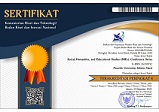INDONESIAN HUMAN RIGHTS POLITIC IN A RESTORATIVE JUSTICE CONCEPT
Abstract
Although restorative justice model has been discouraged internationally, Indonesia has not formally used it within the judicial system. Therefore, in a way to socialize the model, the author is analyzing the cogency of a restorative theory of Primary Stakeholder proposed by McCold using Social Discipline concept on Indonesian human rights cases: Masykur Abdul Kadir against the Terrorism Act, Abilio Soares against Human Rights Court Law, and former members of Indonesian Communist Party-PKI against the General Election Law. The cases were in line with past actions but were in conflict with constitutional human rights protection, so then decided by the Constitutional Court. It were found that the court had to accomplish the needs of legal and political interests within the same time in a way to protect human rights and social comments were matter as they were driving court decisions of the cases. By this, although Masykur and other Bali Bombs trials had attracted social attentions leading to a high social sentiment to punished perpetrators, his legally constitutional rights that also supported by public opinion alongside government political deed had challenged the application the restorative concept. This was also seen in cases of Soares and former members of Indonesian Communist Party.
Keywords
Full Text:
PDFRefbacks
- There are currently no refbacks.





